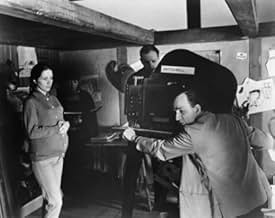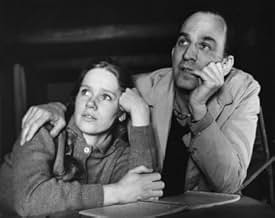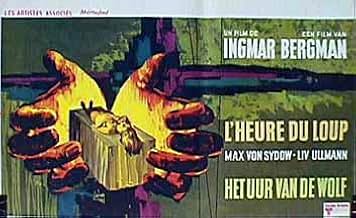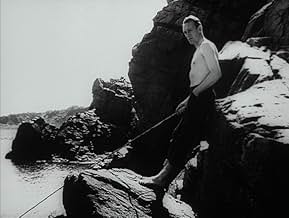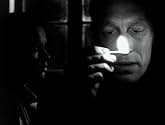CALIFICACIÓN DE IMDb
7.5/10
24 k
TU CALIFICACIÓN
Un artista que pasa sus vacaciones en una remota isla escandinava junto a su joven esposa embarazada sufre una crisis emocional al tratar de enfrentarse a sus deseos reprimidos.Un artista que pasa sus vacaciones en una remota isla escandinava junto a su joven esposa embarazada sufre una crisis emocional al tratar de enfrentarse a sus deseos reprimidos.Un artista que pasa sus vacaciones en una remota isla escandinava junto a su joven esposa embarazada sufre una crisis emocional al tratar de enfrentarse a sus deseos reprimidos.
- Dirección
- Guionista
- Elenco
- Premios
- 2 premios ganados en total
Agda Helin
- von Merken's Maid
- (sin créditos)
Lenn Hjortzberg
- Kreisler
- (sin créditos)
Mikael Rundquist
- Boy in Dream
- (sin créditos)
Folke Sundquist
- Tamino
- (sin créditos)
- Dirección
- Guionista
- Todo el elenco y el equipo
- Producción, taquilla y más en IMDbPro
Opiniones destacadas
Johan can't escape from traumas past, he's tormented, harrowed, provoked and harassed, his mind is playing tricks, it tortures, taunts, afflicts, leaves him confused, muddled, perplexed and aghast.
A surreal overflowing meltdown, full of symbolism, abstraction and confusion, as the artist Johan Borg struggles to cope with the visions and apparitions that haunt his disturbed being. Max von Sydow and Liv Ullman once again present us with characters from the imagination of Ingmar Bergman that exist in an alien world, or at least one most of us are quite unfamiliar with (thank goodness), in a piece of cinema, like so many others from the director, that need revisiting whenever you get the chance, if for no other reason than to see what you missed previously.
A surreal overflowing meltdown, full of symbolism, abstraction and confusion, as the artist Johan Borg struggles to cope with the visions and apparitions that haunt his disturbed being. Max von Sydow and Liv Ullman once again present us with characters from the imagination of Ingmar Bergman that exist in an alien world, or at least one most of us are quite unfamiliar with (thank goodness), in a piece of cinema, like so many others from the director, that need revisiting whenever you get the chance, if for no other reason than to see what you missed previously.
I can't agree with most of the comments above, and particularly find myself taking the completely opposing view to Adrian Ekdahl. While HOUR OF THE WOLF seems eminently worth viewing (what Bergman film isn't?), I think it's substantially less compelling and essential than SHAME, made the same year with the same two principal players.
It took me a long time to see VARGTIMMEN, and I've finally seen it tonight on the big screen. But while I feel it's an essential enough part of the overall Bergman canon, I'd have to place it squarely in the b-list as far as its coherence and overall effectiveness.
While it contains an unusual level of creepiness by Bergman standards (and a complete journey into surrealism, brief as it is, in the final reel that seems very un-Bergmanesque -- he loves his symbolic images, but rarely has he gone this ambiguously surreal route), the truth seems to be that many many directors have achieved more with this kind of film than this film does. Bergman seems a bit out of his element here. Because most of his films utilize his trademark techniques in the service of a subtle, finely-observed, provocative examination of some difficult aspect of human existence, VARGTIMMEN seems to lose its coherence quite a bit in pursuit of something which is admittedly unusual for Bergman.
Ultimately it seems to examine three themes: 1) Can we, if haunted by things that become inarticulable, go mad from them? 2) Can we, if we love or are attuned enough to those we love, share their demons with them? 3) Schizophrenia. (This appears to me to be what Johan Borg seems to be suffering from).
These are interesting themes, to be sure. But Bergman doesn't seem to really go very deeply into them. Instead, he's kind of skimming the surface (uncharacteristic for him) while enjoying (if that can be the right word) the ambiguity of our knowledge of what's going on. Strangely, while I rarely find Bergman emptily pretentious or needlessly arty (which he is obviously occasionally accused of), this film brought me as close to feeling that way as anything I've ever seen of his. Perhaps it's because he wasn't truly at home in these themes of supernatural/horror, etc. This film actually seems DERIVATIVE of better films, like a Franju's EYES WITHOUT A FACE or even DEAD OF NIGHT. Rarely does Bergman suffer in comparison with other filmmakers who came before him. SHAME (again, made that same year, virtually right after this film), is by contrast a deeply troubling, finely wrought examination of far more (to me) compelling, complex, essential and provocative human issues. I would return again and again to SHAME, but I feel no real need to see HOUR OF THE WOLF again.
It belongs in the canon, yes, and should be seen. But while it is a bit unusual visually, I think it winds up seeming rather minor thematically in the overall pantheon of his work.
It took me a long time to see VARGTIMMEN, and I've finally seen it tonight on the big screen. But while I feel it's an essential enough part of the overall Bergman canon, I'd have to place it squarely in the b-list as far as its coherence and overall effectiveness.
While it contains an unusual level of creepiness by Bergman standards (and a complete journey into surrealism, brief as it is, in the final reel that seems very un-Bergmanesque -- he loves his symbolic images, but rarely has he gone this ambiguously surreal route), the truth seems to be that many many directors have achieved more with this kind of film than this film does. Bergman seems a bit out of his element here. Because most of his films utilize his trademark techniques in the service of a subtle, finely-observed, provocative examination of some difficult aspect of human existence, VARGTIMMEN seems to lose its coherence quite a bit in pursuit of something which is admittedly unusual for Bergman.
Ultimately it seems to examine three themes: 1) Can we, if haunted by things that become inarticulable, go mad from them? 2) Can we, if we love or are attuned enough to those we love, share their demons with them? 3) Schizophrenia. (This appears to me to be what Johan Borg seems to be suffering from).
These are interesting themes, to be sure. But Bergman doesn't seem to really go very deeply into them. Instead, he's kind of skimming the surface (uncharacteristic for him) while enjoying (if that can be the right word) the ambiguity of our knowledge of what's going on. Strangely, while I rarely find Bergman emptily pretentious or needlessly arty (which he is obviously occasionally accused of), this film brought me as close to feeling that way as anything I've ever seen of his. Perhaps it's because he wasn't truly at home in these themes of supernatural/horror, etc. This film actually seems DERIVATIVE of better films, like a Franju's EYES WITHOUT A FACE or even DEAD OF NIGHT. Rarely does Bergman suffer in comparison with other filmmakers who came before him. SHAME (again, made that same year, virtually right after this film), is by contrast a deeply troubling, finely wrought examination of far more (to me) compelling, complex, essential and provocative human issues. I would return again and again to SHAME, but I feel no real need to see HOUR OF THE WOLF again.
It belongs in the canon, yes, and should be seen. But while it is a bit unusual visually, I think it winds up seeming rather minor thematically in the overall pantheon of his work.
a man moves to a remote island with his wife. he cannot sleep at night and is tormented by inner demons. the film tracks this madness of his. excellent performances by max snydow and liv ullman. the cinematography is beautiful and precise. as is usual with bergman's films, it is not clear on first viewing what the movie is all about. why the man is tormented, is a mystery, at least to me.
Much like F.W. Murnau, or even David Lynch for that matter, Ingmar Bergman can create horror in a film, such as his rarity in the genre of Hour of the Wolf (no, no werewolves boys and girls, the title refers to something else entirely regarding the middle of the night), by imposing images that are so unbelievable as to either frighten or annoy. Bergman is no stranger to the surreal (Persona his most notorious feat, but surrealism lurks in many Bergman works), and Hour of the Wolf displays his skills at it with a precision that is un-canny. We're given a couple of characters thrust (not entirely by accident) into a strange atmosphere of people, locations, shadows, the night. And with this film, the audience is given images and scenes that are very new, even for a modern audience, but most of the film brings one back to the most chilling of the silent-film horror classics. But that's not to say this is a relatively accessible Bergman film, unless you are very much into the genre.
Max Von Sydow and Liv Ullman give strong performances as a couple (one an artist the other his pregnant wife) who arrive on an island to have some peace, where he can get some work done. But this is not the case as Von Sydow's character goes through a kind of deconstruction in the night- he can't sleep, he's shaken to intense uncomfort by neighbors, and a particular memory haunts him all the time (and once Bergman shows what it is, it becomes one of the most horrifying scenes I may have ever seen). If there is a climax to the film it's difficult to discern- the only flaw I had with the film, that sometimes it's almost TOO bizarre- however what leads up to it is a skillful work at experimental theatricality. Everything seems real enough to draw the audience in, and everything seems un-real enough for the audience to be disconnected enough to understand the surreal nature. To put it another way, it's a good film to scare the hell out of you as a midnight movie.
Max Von Sydow and Liv Ullman give strong performances as a couple (one an artist the other his pregnant wife) who arrive on an island to have some peace, where he can get some work done. But this is not the case as Von Sydow's character goes through a kind of deconstruction in the night- he can't sleep, he's shaken to intense uncomfort by neighbors, and a particular memory haunts him all the time (and once Bergman shows what it is, it becomes one of the most horrifying scenes I may have ever seen). If there is a climax to the film it's difficult to discern- the only flaw I had with the film, that sometimes it's almost TOO bizarre- however what leads up to it is a skillful work at experimental theatricality. Everything seems real enough to draw the audience in, and everything seems un-real enough for the audience to be disconnected enough to understand the surreal nature. To put it another way, it's a good film to scare the hell out of you as a midnight movie.
Our early encounters with Johan Borg, played by the enigmatic, Max von Sydow do not encourage our sympathy. The painter seems troubled but boorish with it and something of a bully. Liv Ullmann is wonderful as his long suffering wife, Alma, and really tries to help her husband overcome his illness. This is the reason they are on the (deserted?) island, to give him a chance to overcome his demons. And what demons! For the first half of the film we are about as bemused as Alma as to what is going on with all the various encounters, but as the film progresses we are drawn in further, as is she. The artist overcome by his own creative imaginings or a sick man struggling with his nightmares? Can one tell the difference in the end? As the two main characters finally fall in together, dragging us with them a full blown Gothic melodrama opens up and almost engulfs us all. Most original and horrifying work. I don't know if it was just me but I had to play this with 'hard of hearing' English as I could find no other English track on the DVD.
¿Sabías que…?
- TriviaBergman defines "The Hour of the Wolf" as "The time between midnight and dawn when most people die, when sleep is deepest, when nightmares are most palatable. It is the hour when the sleepless are pursued by their sharpest anxieties, when ghosts and demons hold sway. The hour of the wolf is also the hour when most children are born." According to "Films in Review" critic Henry Hart in the U.S. it's about 4 a.m. when the body's resistance is least.
- Versiones alternativasThere exists an earlier version of the film with an additional, meta-cinematic framing device. In the prologue (lasting about 7 minutes), Bergman is seen on the set directing his actors. The epilogue (lasting about 1 minute) shows us the set being torn down and the crew leaving. These sequences are the only differences to the commonly seen version. Bergman has stated in an interview that he cut off these sequences himself before the general release of the film, as he came to the conclusion that they were just "self-deception". Despite this, a Swedish 35 mm print of the original, longer version does exist, although it's not available on home video in any format.
- ConexionesEdited into 365 days, also known as a Year (2019)
Selecciones populares
Inicia sesión para calificar y agrega a la lista de videos para obtener recomendaciones personalizadas
- How long is Hour of the Wolf?Con tecnología de Alexa
Detalles
- Tiempo de ejecución1 hora 28 minutos
- Color
- Mezcla de sonido
- Relación de aspecto
- 1.37 : 1
Contribuir a esta página
Sugiere una edición o agrega el contenido que falta

Principales brechas de datos
By what name was La hora del lobo (1968) officially released in India in English?
Responda

